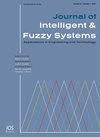AQU-FRC Net: Automated soil prediction based on faster RCNN with aquila optimization
IF 1
4区 计算机科学
Q3 COMPUTER SCIENCE, ARTIFICIAL INTELLIGENCE
引用次数: 0
Abstract
In agriculture, selecting an “appropriate plant for an appropriate soil” is a crucial stage for all sorts of lands. There are different types of soil found in India. It is necessary to understand the features of the soil type to predict the types of crops cultivated in a particular soil. This leads to significant inconsistencies and errors in large-scale soil mapping. However, manually analyzing the soil type in the laboratory is cost-effective and time-consuming, yet it produces an inaccurate classification result. To overcome these challenges, a novel AQU-FRC Net (Aquila – Faster Regional Convolutional Neural Neural) is proposed for the automatic prediction of soil and recommending suitable crops based on a soil-crop relationship database. The soil images were pre-processed using a Scalable Range-based Adaptive Bilateral Filter (SCRAB) for eliminating the noise artifacts from the images. The pre-processed images were classified using Faster-RCNN, which utilized MobileNet as a feature extraction network. The classification results were optimized by the Aquila optimization (AQU) algorithm that normalizes the parameters of the network to achieve better results. The proposed AQU-FRC Net achieves a high accuracy of 98.16% for predicting soil. The experimental results demonstrate that the model successfully predicts the soil when compared to other meta-heuristic-based methods.aqua - frc网:基于快速RCNN和aquila优化的自动土壤预测
在农业中,选择“适合土壤的合适植物”是各种土地的关键阶段。印度有不同类型的土壤。了解土壤类型的特征是预测在特定土壤中种植的作物类型的必要条件。这导致了大尺度土壤制图的显著不一致和错误。然而,在实验室手工分析土壤类型既经济又耗时,而且分类结果不准确。为了克服这些挑战,提出了一种新的Aquila - Faster Regional Convolutional Neural Neural (Aquila - Faster区域卷积神经网络)网络,用于基于土壤-作物关系数据库自动预测土壤并推荐合适的作物。使用基于可缩放距离的自适应双边滤波器(SCRAB)对土壤图像进行预处理,以消除图像中的噪声伪影。预处理后的图像使用Faster-RCNN进行分类,该算法利用MobileNet作为特征提取网络。采用Aquila优化(aquu)算法对分类结果进行优化,该算法对网络参数进行归一化,以获得更好的分类结果。所提出的aqua - frc网对土壤的预测精度达到98.16%。实验结果表明,与其他基于元启发式的方法相比,该模型能够成功地预测土壤。
本文章由计算机程序翻译,如有差异,请以英文原文为准。
求助全文
约1分钟内获得全文
求助全文
来源期刊

Journal of Intelligent & Fuzzy Systems
工程技术-计算机:人工智能
CiteScore
3.40
自引率
10.00%
发文量
965
审稿时长
5.1 months
期刊介绍:
The purpose of the Journal of Intelligent & Fuzzy Systems: Applications in Engineering and Technology is to foster advancements of knowledge and help disseminate results concerning recent applications and case studies in the areas of fuzzy logic, intelligent systems, and web-based applications among working professionals and professionals in education and research, covering a broad cross-section of technical disciplines.
 求助内容:
求助内容: 应助结果提醒方式:
应助结果提醒方式:


